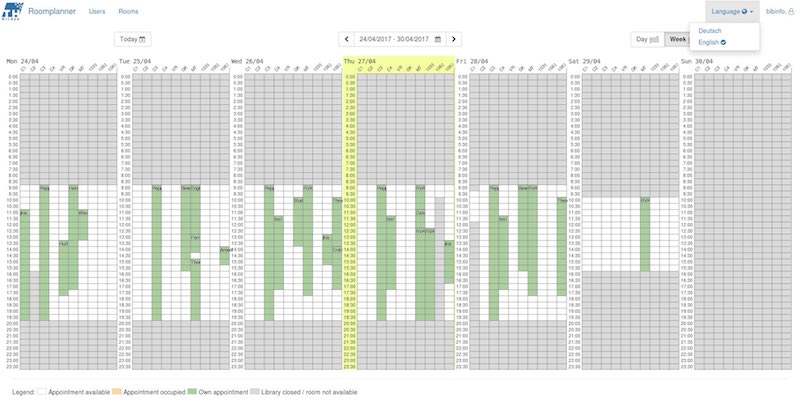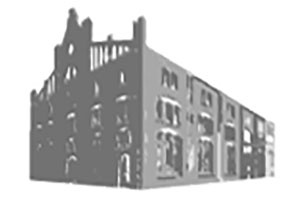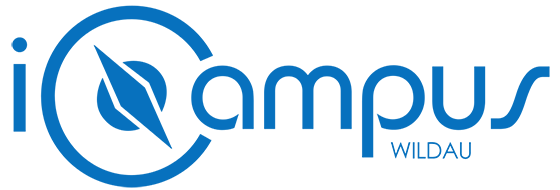WEB-BASED SERVICES
Years ago, librarians and other employees in a library shaped the look and vision of a library, however, online services influence a library much more today. Nowadays, it depends on your homepage and what is on offer there and this is what influences how attractive a service center is going to be.
This is why for years now, we have been involved in developing digital services or adopting them from open source solutions, in order to assist the user on his/her virtual walk in finding quick solutions; solutions that the user needs. This includes services such as images of covers for new items, structured search methods for thesauri, inviting images of important topics, a booking system for rooms, ordering systems and much more.
Adopting Open Source
Virtual visualization
Surprisingly, many services support backward services and often you only find them, if you search far and wide. Visual aspects, for instance, help with serendipitous surprises: ‘the occurrence of events by chance in a beneficial way’. Regarding open source, we were successful in creating these moments with our university bibliography, arranged as a roundabout with pictures of the teachers and a list of their publications. A similar path is interspersed with our new e-book purchases and thus invites our guests to browse through our new acquisitions. The example you find below is based on the java script library three.jsthree.js, which can be used for a 3-D view in your browser. In this case, the periodic system serves as a model for the animation. However, instead of elements of the periodic system, there are visuals of book covers.
Automation of information services
Efficient automation tools became essential for organizing a variety of events such as workshops, symposiums and funding of associations as well as projects like publications of collected volumes. Moreover, the organization of such meetings as the 6th Library Congress for university head librarians which took place in Leipzig this year, also benefit from this. Therefore, the library team employs the open source program “OpenEMM” in a multitude of circumstances with ease.
iQvoc
We use the open source software “iQvoc” for the creation and maintenance of our library’s thesaurus. It is one of the few free-to-use tools for vocabulary management in the linked data context. Since other libraries realized that the university library in Wildau successfully runs a functional instance of “iQvoc”, our library is reached daily by institutions, which are in search of information about the employment of this tool. At the Library Congress in Leipzig, our library was invited to a second meeting about vocabulary management systems in order to share experiences.
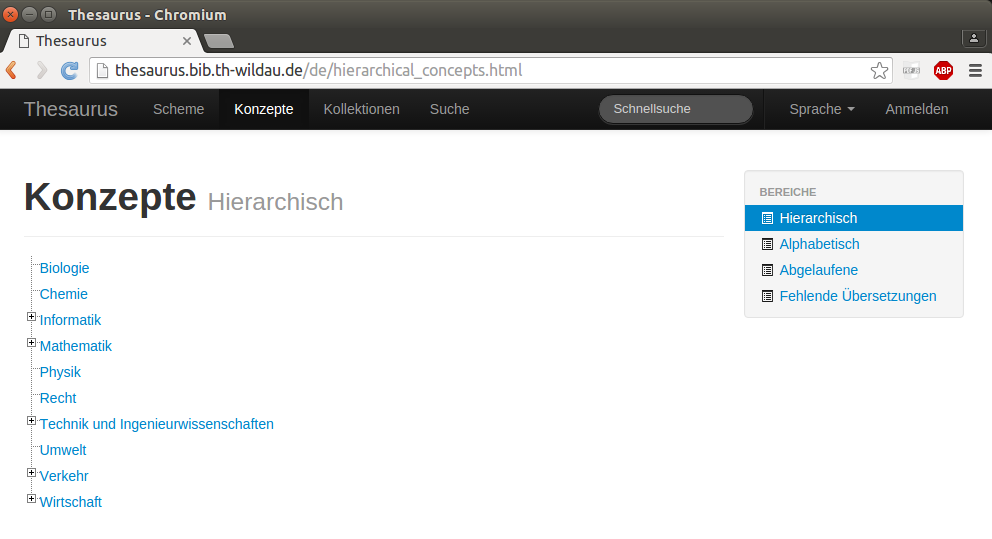
Koha
Since the end of the year 2012, the university library has hosted the library management system “Koha” as an open source for the Wildau public library. Through this, we support an active partnership with the local public library. We are also involved in other joint special events such as “Schmökerabend” and “StadtLesen”.
In-house development
BibloVis
Empirical evidence to find out the needs of the users through the use of the library is a fundamental concern of libraries, since we have to calculate our efficiency and effectiveness outside of the single figure of our collection. It is an important concern of our library to guarantee transparency, especially vis à vis decision makers such as library commissions and university administration. Therefore, a web-based tool to analyze every upcoming statistic regarding our information facility was developed in the Department of Telematics and was financed by external funds. These analyses can be referred to by entitled personnel at any time and help with purchasing or budget-related decisions.
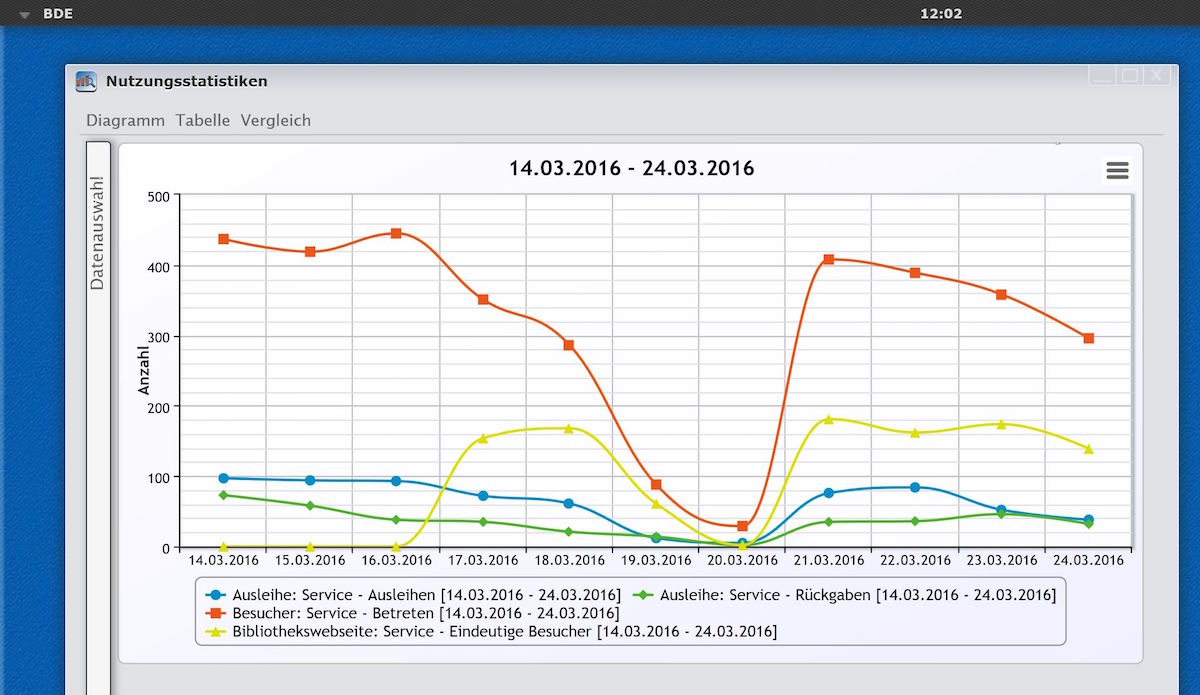
Room allocation
Beginning in the Summer Semester 2017, faculty, staff and students at the Technical University of Applied Sciences Wildau will be able to book rooms automatically thanks to the university’s UNIDOS App. This can be done by first logging into the university account and then through the authentification of the user. The library team handles bookings for three group seminar rooms in the library, four cubicle work areas as well as three other seminar rooms elsewhere on campus. In this way, they can now all be booked automatically. Smart cards and keys for entrance are issued through RFID Tag. The software needed for this was developed at the university.
Competence cluster and purchasing strategies 2.0
A faculty of approximately 80 professors and lecturers at the Technical University of Applied Sciences in Wildau must be provided with specialist literature without the help of librarians from the respective fields. At the Technical University of Applied Sciences Wildau a system was developed, which allows faculty and staff of the library to tag thematic core themes of research and science. This broad list offers, among other things, the cooperation with a web shop developed by the library association “GBV”. This shop can be compared to Amazon and allows every faculty member to browse through newly released literature, make them available for their faculty. By using the web shop as a basis, they can send a purchase order directly to the library.
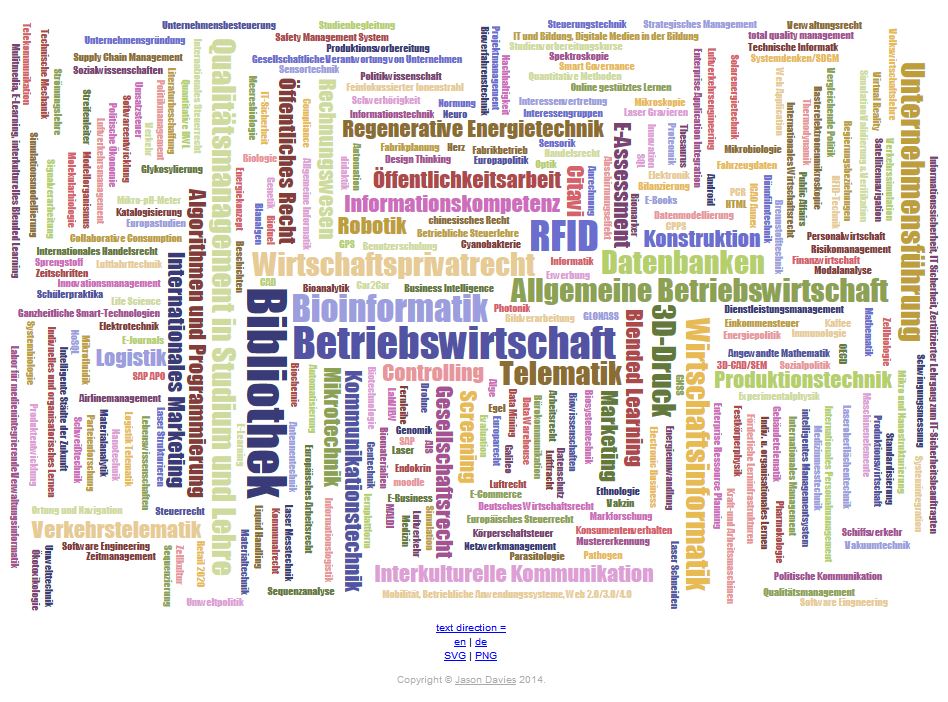
A second approach to guarantee the direct link from the purchaser to distribution when purchasing media item, is the business routine of online created module handbooks. At the Technical University of Applied Sciences Wildau, every course of study is recorded in a web-based system, including literature lists. This bibliography is arranged interactively. In this way, missing literature can be directly ordered using the system surface. This approach secures that information facilities without subject specialists like us, still have a direct link to our target group, the faculty at the university.

Interactive presentation of historical texts
The university library has supported the indexing of the Maria Heyde since 2002. She was a missionary of the Moravian Church in Western Tibet in the second half of the 19th century and left behind many diaries, which cover a time frame of more than 40 years. In cooperation with the work group at the centre for general scientific education called “Zentrum für Allgemeine Wissenschaftliche Weiterbildung (ZAWiW) at the University of Ulm, a web-based presentation surface was created as a prototype. This presentation surface links the transcriptions with further information such as pictures, maps and references from the glossary. Further information at: http://194.95.49.222/public/demo-heyde/
